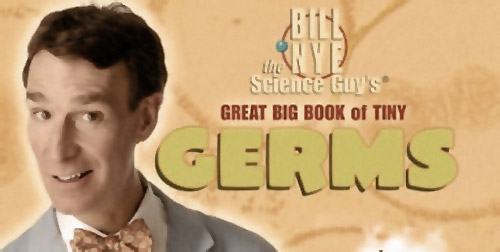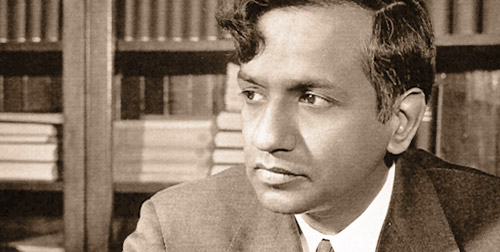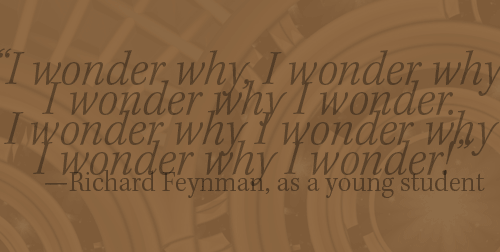I wanted to alert everyone to our upcoming events. There are still openings for our big Caltech conference Brain, Mind & Consciousness. There are also tickets still available for Julia Sweeney’s show on Letting Go of God, which will be followed by a private dinner with Julia at her home, which is a fundraiser (as is the conference) for the Skeptics Society. Julia’s show and dinner are on the Sunday of conference, so please read about both below.
I’ll see you all soon at these upcoming events. I should be walking normal by then. Oh, I got hit by a car on my bike. Or, more precisely, I hit the car head-on, shattering the windshield in two places with my head and hip. Fortunately I was wearing a helmet or else I’d be in a persistent vegetative state right now. Unfortunately, we cyclists don’t wear body armor, so I’ve got one heck of a hematoma and bruise on my leg where I hit, and my hips hurt like hell. But no broken bones so I am on a speedy road to recovery after suffering through a miserable one-week lecture road trip, hobbling through airports and dragging my luggage and pain-riddled body through airport security systems.
What fun!
Michael Shermer

Great Big Book of Tiny Germs
Bill Nye the Science Guy
Sunday, April 24th, 2:00 pm
at the Beckman Auditorium, Caltech, Pasadena, CA
(please note that this is a different location at Caltech,
adjacent to our regular Baxter Lecture Hall venue)
Germs, germs, everywhere! We live with them all day, every day. Did you know that: Some germs are good for you, or even delicious? There are more germs inside you than there are people on Earth? Your body is constantly fighting germs, even when you aren’t sick? Come hear Bill speak, and you’ll learn about these things and more. Find out about germs and how to stay healthy in this delightful presentation based on his new book, as well as a few new things from Nye Labs. Bring the kids, and the kids’ friends, for an afternoon of science and a blast of fun.
Bill Nye is best known for his hit PBS television series Bill Nye the Science Guy, which ran from 1992–1998 and won Emmy Awards for Best Performer, Best Writing, Best Producing, and Best Show. He is the host of the Science Channel’s 100 Greatest Discoveries in Science, and the forthcoming series The Eyes of Nye. He is the author of Bill Nye’s Big Blast of Science, Bill Nye’s Consider the Following, Bill Nye the Science Guy’s Big Blue Ocean, and Bill Nye the Science Guy’s Great Big Dinosaur Dig. He is also an inventor, with patents pending for a baseball retrieval device, a ball throwing technique training gizmo, and an improved ballet toe shoe. As part of the Mars Athena Exploration Team, he played a key role in the design of the MarsDials, the sundials on Mars. Bill serves on the boards of The Planetary Society as Vice President, the New Horizons Mission to Pluto, and the National Health Museum in Washington, DC.
tickets
Because of our expense in renting the larger venue, the prices are higher for this special event: $12 for non-members; $8 for Skeptic members; $5 for students under 18 or people carrying Caltech or JPL id.

photo: Subrahmanyan Chandrasekhar (Chandra), one of the discoverers of Black Holes, who is featured in Miller’s book and lecture
Empire of the Stars
Obsession, Friendship & Betrayal in the Quest for Black Holes
with Dr. Arthur I. Miller
Sunday, May 1st, 2:00 pm
at the Baxter Lecture Hall, Caltech, Pasadena, CA
In August 1930, on a voyage from Madras to London, a young Indian looked up at the stars and contemplated their fate. Subrahmanyan Chandrasekhar – Chandra, as he was called – calculated that certain stars would suffer a most violent death, collapsing to virtually nothing. This extraordinary claim, the first mathematical description of black holes, rankled one of the greatest astrophysicists of the day, Sir Arthur Eddington, who in 1935 publicly ridiculed Chandra, sending him into an intellectual and emotional tailspin – and hindering the progress of astrophysics for nearly forty years. Tracing the rise of two great theories, relativity and quantum mechanics, which meet head on in black holes, Miller recounts the dramatic story of this intellectual feud. This sweeping history examines the quest to understand one of the most forbidding objects in the universe as well as the passions that fueled that quest over the course of a century.
Dr. Arthur I. Miller is Professor of History and Philosophy of Science, Department of Science & Technology Studies, University College, London. He lives in London.
tickets
Admission at the door (no pre-event ticket sales): $5 Skeptics Society members; $8 nonmembers; $5 students.

Brain, Mind & Consciousness
The Skeptics Society Annual Conference
Friday, Saturday, Sunday, May 13–15
at the Westin Resort & Hotel
and the Beckman Auditorium, Caltech, Pasadena, CA
Research on the brain, mind, and consciousness was given a significant boost by Nobel laureate Dr. Francis Crick in 1994, when he wrote in his book, The Astonishing Hypothesis, that you, your joys and your sorrows, your memories and your ambitions, your sense of personal identity and free will, are in fact no more than the behavior of a vast assembly of nerve cells and their associated molecules.”
This is what is called “the hard problem” – explaining how billions of neurons swapping chemicals give rise to such subjective experiences as consciousness, self-awareness, and awareness that others are conscious and self-aware; that is, not only the ability to wonder, but the ability to wonder why we wonder, and even wonder why others wonder why.
Explaining each of the functional parts of the brain is the easy problem, such as the differences between waking and sleep, discrimination of stimuli, or the control of behavior. By contrast, what has come to be known as the hard problem in consciousness studies is experience: what it is like to be in a given mental state. Adding up all of the solved easy problems does not equal a solution to the hard problem. Something else is going on in private subjective experiences – called qualia – and there is no consensus on what it is.
Dualists hold that qualia are separate from physical objects in the world and that mind is more than brain. Materialists contend that qualia are ultimately explicable through the activities of neurons and that mind and brain are one. Our speakers, some of the top neuroscientists in the world, will address these and other problems, such as the evolution of the brain, and how and why it got to be so large. Skeptics will get a chance to interact with these world-class scientists on the breaks, during meals, and in a formal discussion period. We will also consider the implications of this new brain research to better understand apparent paranormal phenomena, as well as how and why people believe weird things.
Special Guest:
- Mike Reiss, head writer for The Simpsons
Magicians:
- James “The Amazing” Randi
- Bob Friedhoffer, the “madman of magic”
- mentalist Mark Edwards
- illusionist Jerry Andrus
Speakers:
- Dr. John Allman
- Molecular, Cellular, and Integrative Neuroscience, Biology Division, California Institute of Technology, author of Evolving Brains, conducts research on the evolution and development of the brain, reconstructions of cerebral cortex, the interface between emotion and cognition, and the relationship between the anterior cingulate cortex and attention deficit disorder, depression, obsessive-compulsive disorder, phobias, post-traumatic stress, and anxiety disorders.
- Dr. Susan Blackmore
- is a Visiting Lecturer at the University of the West of England, Bristol. With degrees in psychology and physiology from Oxford University and a Ph.D. in parapsychology from the University of Surrey, her research interests include memes and the theory of memetics, evolutionary theory, consciousness, and meditation. She is author of Beyond the Body, Dying to Live, In Search of the Light, Test Your Psychic Powers, The Meme Machine, and Consciousness: An Introduction.
- Dr. Ursula Goodenough
- Professor of Biology, Washington University, St. Louis, MO; conducts research on cell biology, the evolution of the genes governing mating-related traits, the molecular basis for flagellar motility, emergent properties in biological systems, the evolution of symbolic communication in primates, and the interface of science and religion. She is the author of the widely adopted textbook, Genetics, and of the popular science book, The Sacred Depths of Nature.
- Dr. Alison Gopnik
- Professor of Psychology, University of California, Berkeley; runs the cognitive development lab, conducting research on cognition, brain, and behavior; theory of mind; psychology and philosophy; how children develop and change intuitive theories of the world in much the way that scientists do; children’s causal knowledge and causal learning across domains, including physical, biological and psychological knowledge; in essence, how the brain learns to think.
- Dr. Christof Koch
- obtained his Ph.D. in (bio)-physics with a minor in Philosophy. After four years at MIT, he joined the California Institute of Technology, where he is the Lois and Victor Troendle Professor of Cognitive and Behavioral Biology. His laboratory focuses on experimental and computational research pertaining to neuronal correlates of selective visual attention and consciousness in the mammalian brain, a topic he has worked on for the past 16 years with Francis Crick.
- Dr. Richard J. McNally
- Department of Psychology, Harvard University, author of Remembering Trauma and the classic paper in Psychological Science, “Psychophysiological Responding During Script-Driven Imagery in People Reporting Abduction by Space Aliens,” in which he demonstrates that imaginary traumas are as terrifying as the real thing. Conducts research on memories: true, false, recovered, repressed, and remembered.
- Dr. Steven Quartz
- Division of Humanities & Social Sciences, and Computation and Neural Systems Program, California Institute of Technology, co-author of Liars, Lovers, and Heroes: What the New Brain Science Reveals About How We Become Who We Are, conducts research in neuroeconomics, the neural correlates of product branding, and the neuroscience of cooperation, competition, and the development of trust.
- Dr. V. S. Ramachandran
- Director of the Center for Brain and Cognition and Professor of Psychology, University of California, San Diego, author of Phantoms in the Brain: Probing the Mysteries of the Human Mind, The Emerging Mind, and A Brief Tour of Human Consciousness, and is Editor-in-chief of the Encyclopedia of Human Behaviour. Newsweek magazine called him one of the “hundred most prominent people to watch in the next century.”
- Dr. Hank Schlinger
- Department of Psychology, California State University, Northridge, author of Psychology: A Behavioral Overview, A Behavior-Analytic View of Child Development, and Introduction to Scientific Psychology and has published scientific articles in journals including the American Psychologist, Journal of the Experimental Analysis of Behavior, Pharmacology, Biochemistry and Behavior, Psychopharmacology, Psychological Record, The Analysis of Verbal Behavior, The Behavior Analyst, Skeptic and Skeptical Inquirer.
- Dr. Terry Sejnowski
- Director, Computational Neurobiology Laboratory, Salk Institute, Advisory Board Chair of The Science Network, author of Liars, Lovers, and Heroes: What the New Brain Science Reveals About How We Become Who We Are, conducts research on the hippocampus, believed to play a major role in learning and memory; and the cerebral cortex, which holds our knowledge of the world and how to interact with it.
- Dr. Paul Zak
- Center for Neuroeconomics Study, Claremont Graduate University, conducts research on the neurobiology of trust, the neural substrates of reward valuation, the relationship of touch and trust, and the link between economic systems, social structures, and trust.
tickets
Register online (www.skeptic.com/conf/reg.html) or call 626-794-3119
$150 Skeptics Society members, $175 nonmembers, $75 Students

photo: Julia Sweeney in rehearsal
Letting Go of God
Julia Sweeney
Sunday, May 15th, 3:00–5:30 pm show
Hudson Backstage Theater, Hollywood, CA
followed by dinner at Julia’s home
Julia Sweeney, one of the city’s most critically-acclaimed actresses and monologists returns to the stage with the third chapter in her extraordinary trilogy Letting Go of God; a comical and poignant story of a woman’s struggle with faith in our modern, scientific era. This is followed by a private catered dinner at Julia Sweeney’s home after her show, with Julia, Michael Shermer, and other skeptic VIPs and speakers from the Brain, Mind & Consciousness conference. Show your support for the Skeptics Society and for Julia’s courageous story by joining us for an afternoon and evening of enlightenment and entertainment.
“Julia Sweeney’s brave, hilarious, ultimately moving solo show is a gale-force of fresh air.” —L.A. Times
“Funny! Sweeney never fails to surprise.” —L.A. Weekly
“A consummate storyteller with exquisite comic timing.” —Variety
directions
Five blocks east of Highland on 6539 Santa Monica Blvd., the northeast corner of Hudson Avenue and Santa Monica Blvd. There will be a bus at the Westin Hotel to take conference people to the show and bring them back; or locals can drive themselves to the theater and Julia’s home. (www.hudsontheatre.com)
tickets
Theater tickets $50; dinner $150
There are 100 seats in the theater, but Julia’s home can only accommodate 60 people for the dinner, so make your reservations immediately by sending a check or Visa or Mastercard (and expiration date) to Skeptics Society, P.O. Box 338, Altadena, CA 91001; 626-794-3119 (phone); 626-794-1301 (fax). Julia has generously donated all proceeds from the theater show and dinner to the Skeptics Society in conjunction with our annual fundraising campaign.









